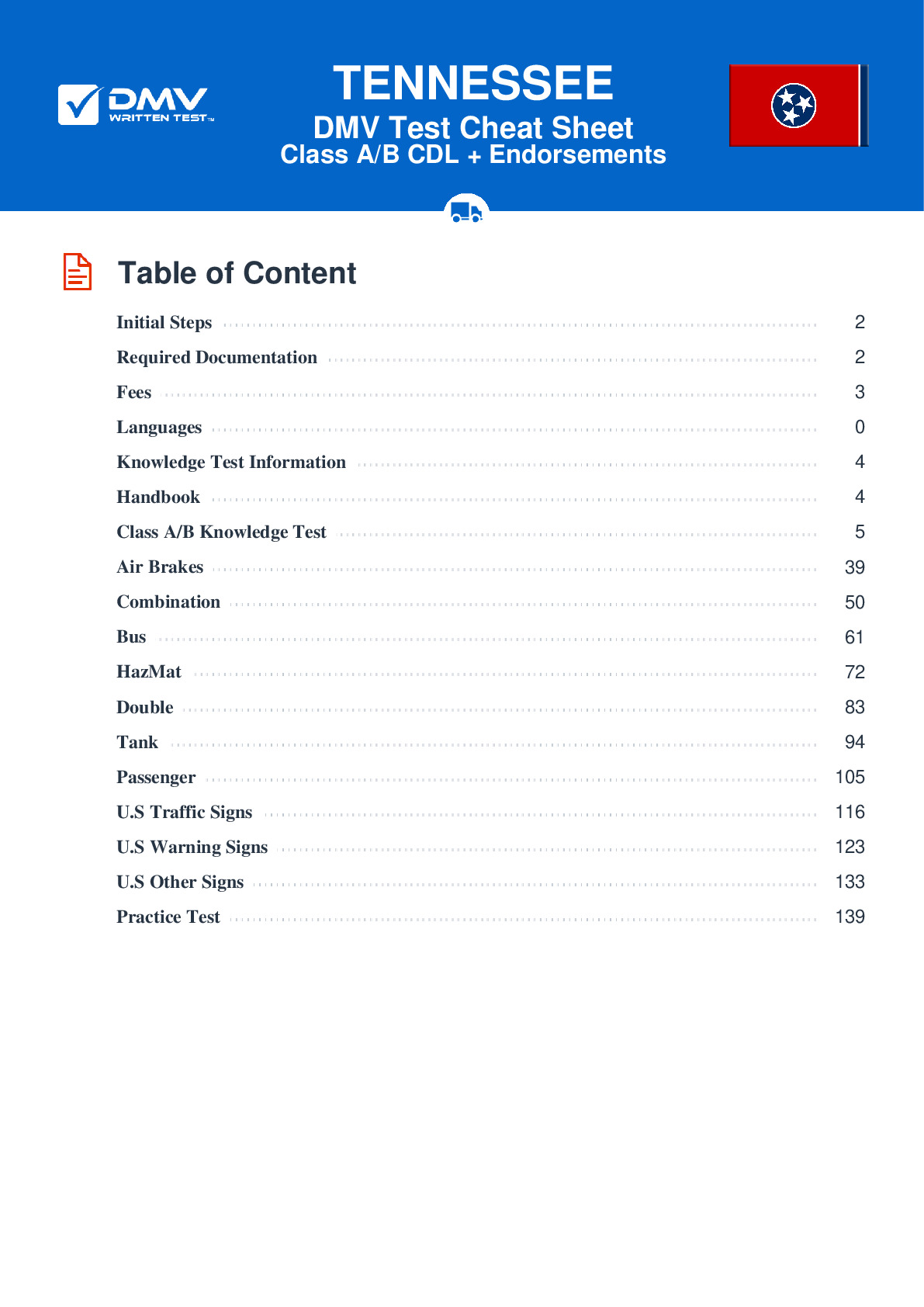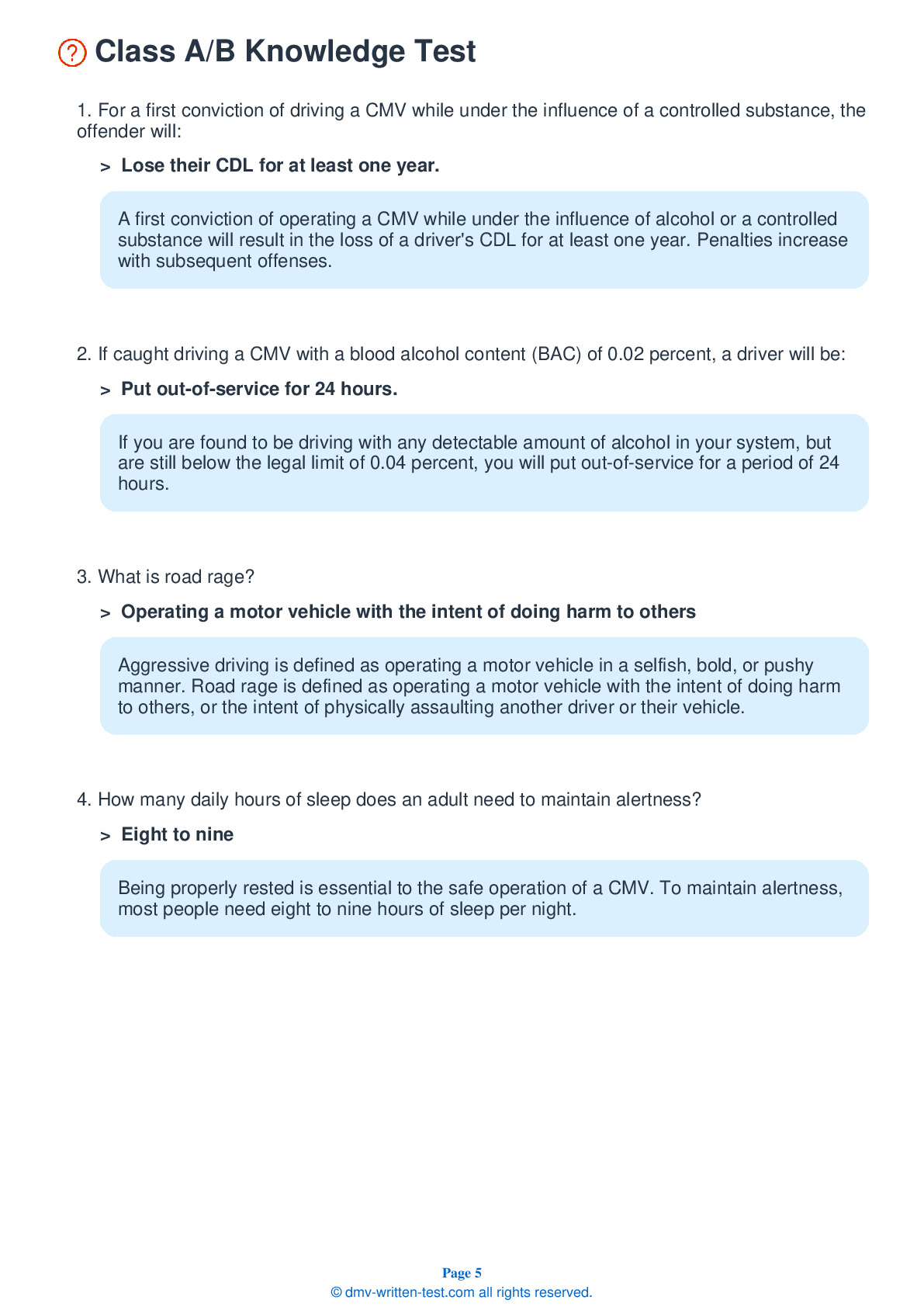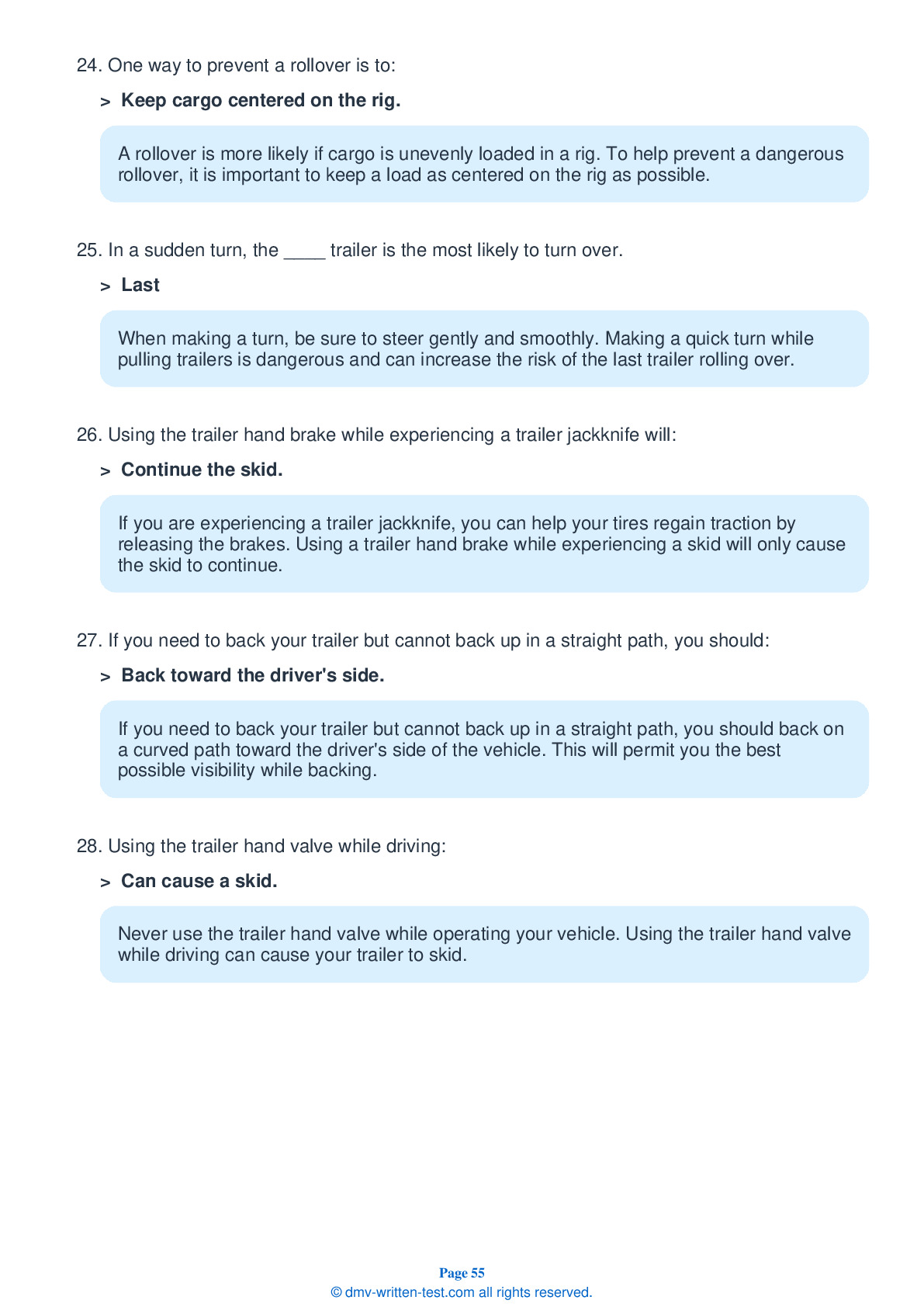Knowledge Test Class A
This license is required for driving any legal combination of vehicles, with a gross combination weight rating of 26,001 pounds or more, provided the GVWR of a trailer exceeds 10,000 pounds To receive this license, applicants must pass a 50-question test. To pass, applicants must answer 40 questions correctly. Each question has three or four possible answer choices. Test questions come from the Commercial Driver License Manual. Questions come from chapters covering: Introduction, Driving Safely, Transporting Cargo Safely, Air Brakes (if applicable), Pre-Trip Vehicle Inspection Test, Basic Vehicle Control Skills Test and On-Road Driving.. Endorsements that may be used with a Class A CDL are: Hazardous materials, Tank, Passenger, HazMat and Tank, Air Brakes and School bus.
15. During an applied leakage test, what is the maximum leakage rate that is safe for a single vehicle with air brakes?
It is important to know the maximum air loss rate that is safe for your specific vehicle. A single vehicle with air brakes should have a leakage rate no higher than 3 psi in a minute during an applied leakage test.
16. How can you check for a leak in hydraulic brakes?
Check hydraulic brakes by pumping the brake pedal three times before applying firm pressure to the pedal for five seconds. The pedal should not move. If it does, there may be a leak or some other problem in the braking system.
17. If a vehicle gets stuck on a railroad track, the driver should:
If your vehicle gets stuck on railroad tracks, immediately exit the vehicle and get away from the tracks. Check signs or signal housing at the crossing for emergency contact information. Call the emergency contact or call 911.
18. A skid caused by acceleration can likely be solved by:
Skids caused by acceleration frequently occur on slippery road surfaces. These skids can generally be resolved by the driver removing their foot from the accelerator.
19. What kind of force must emergency brakes use?
Because air pressure can eventually leak away, the emergency brakes in an air brake system must be held on by mechanical force.
20. When you leave your vehicle, you should:
The parking brake should be applied when leaving your vehicle.
21. When doing an inspection, make sure your brake pads are:
Potential problems to check for when inspecting brakes include cracked drums; shoes or pads with oil, grease, or brake fluid on them; and shoes that are missing, broken, or worn dangerously thin.
Frequently Asked Questions
- Tractor-trailers
- Truck and trailer combinations
- Livestock carriers
- Tanker trucks
- Flatbed trucks
- Dump trucks with trailers
- Logging trucks with trailers
- Car carriers with trailers
Additionally, a Class A CDL license in Tennessee also allows you to operate vehicles in the Class B and Class C categories, provided you have the appropriate endorsements. This expands your driving privileges to include buses, passenger vans, and vehicles transporting hazardous materials.
1. Age: You must be at least 18 years old to operate a commercial vehicle within Tennessee, and 21 years old to operate a commercial vehicle outside the state.
2. Valid driver’s license: You must have a valid driver’s license issued by the state of Tennessee.
3. Medical certification: You must pass a medical exam and obtain a medical certificate from a certified medical examiner to ensure you are physically able to operate a commercial vehicle.
4. Knowledge tests: You must pass a series of knowledge tests, including general knowledge, air brakes, and combination vehicles.
5. Skills tests: You must pass a series of skills tests, including pre-trip inspection, basic vehicle control, and on-road driving.
6. Background check: You must pass a background check and be free of any disqualifying criminal offenses.
7. Fees: You must pay the appropriate fees for the application, testing, and licensing process.
It is also important to note that you may need to obtain additional endorsements on your CDL license for certain types of vehicles or cargo, such as hazardous materials or passenger transport.
1. Combination vehicles (double/triple trailers): This endorsement is required if you plan to operate a combination of vehicles with two or three trailers.
2. Tanker: This endorsement is required if you plan to transport liquids or gases in bulk containers with a capacity of 1,000 gallons or more.
3. Hazardous materials: This endorsement is required if you plan to transport hazardous materials as designated by the U.S. Department of Transportation.
4. Passenger: This endorsement is required if you plan to operate a vehicle designed to transport 16 or more passengers, including the driver.
To obtain these endorsements, you must pass additional knowledge and skills tests specific to each endorsement. It is important to note that some endorsements may also require background checks and additional fees.
1. Pre-trip inspection: You will be required to perform a thorough inspection of your commercial vehicle, including checking the brakes, tires, lights, and other safety equipment. You will need to identify any defects or malfunctions and explain how you would correct them.
2. Basic vehicle control: You will be required to demonstrate your ability to control your commercial vehicle in a variety of situations, such as backing up, turning, and parking.
3. On-road driving: You will be required to demonstrate your ability to safely operate your commercial vehicle in real traffic situations. This includes merging onto highways, changing lanes, turning at intersections, and responding to traffic signals and signs.
You will be graded on your ability to perform each part of the skills test safely and correctly. It is important to practice and prepare for the skills test before taking it. You may also be required to bring your own commercial vehicle for the skills test.
1. Age restrictions: To obtain a Class A CDL, you must be at least 18 years old. However, you will only be able to operate commercial vehicles within the state of Tennessee until you are 21 years old.
2. Vehicle weight: You may be limited to operating commercial vehicles that weigh less than 26,001 pounds with a Class A CDL.
3. Endorsement restrictions: As mentioned earlier, certain endorsements may be required for specific types of vehicles or cargo. If you do not have the necessary endorsements, you will be restricted from operating those types of vehicles.
4. Medical requirements: You must pass a medical examination every two years to maintain your Class A CDL. If you have certain medical conditions, such as diabetes or high blood pressure, you may need to obtain a medical waiver to continue driving.
5. Alcohol and drug use: You may not operate a commercial vehicle with a blood alcohol concentration (BAC) of 0.04% or higher. You may also be subject to random drug and alcohol testing by your employer or the federal government.
It is important to follow all restrictions and limitations associated with your Class A CDL license to ensure your safety and the safety of others on the road.
It is important to note that if you choose to use an interpreter, you must provide them yourself and they must be approved by the Department of Safety and Homeland Security. You will also need to let the testing center know in advance if you plan to use an interpreter so that they can make appropriate arrangements.
Also, it is recommended that you have a good understanding of English, as many road signs and instructions are in English. It is essential to have a good knowledge of the language to pass the written test and operate a commercial vehicle safely on Tennessee roads.
To request accommodations, you will need to contact the Department of Safety and Homeland Security’s Driver Services Division at least 30 days before your scheduled test date. You will need to provide documentation of your disability and describe the specific accommodations you need.
Examples of accommodations that may be provided include extended testing time, a separate testing room, or a sign language interpreter. The department will work with you to determine the appropriate accommodations based on your disability and needs.
It is important to note that accommodations are provided on a case-by-case basis and are subject to approval by the department. You should also be aware that some accommodations may require additional fees or scheduling considerations.
If you fail the test, you will need to wait at least one day before retaking it. If you fail the test three times, you will be required to wait at least 30 days before taking the test again. If you fail the test more than three times, you will be required to wait at least six months before taking it again.
It's important to note that there is a fee for each attempt at the Class A CDL written test. Therefore, it's important to prepare thoroughly for the test before taking it to avoid having to pay additional fees for retakes.
If you are having difficulty passing the Class A CDL written test, there are resources available to help you prepare. You can find study materials and practice tests online, or consider enrolling in a commercial driver's license training program.




